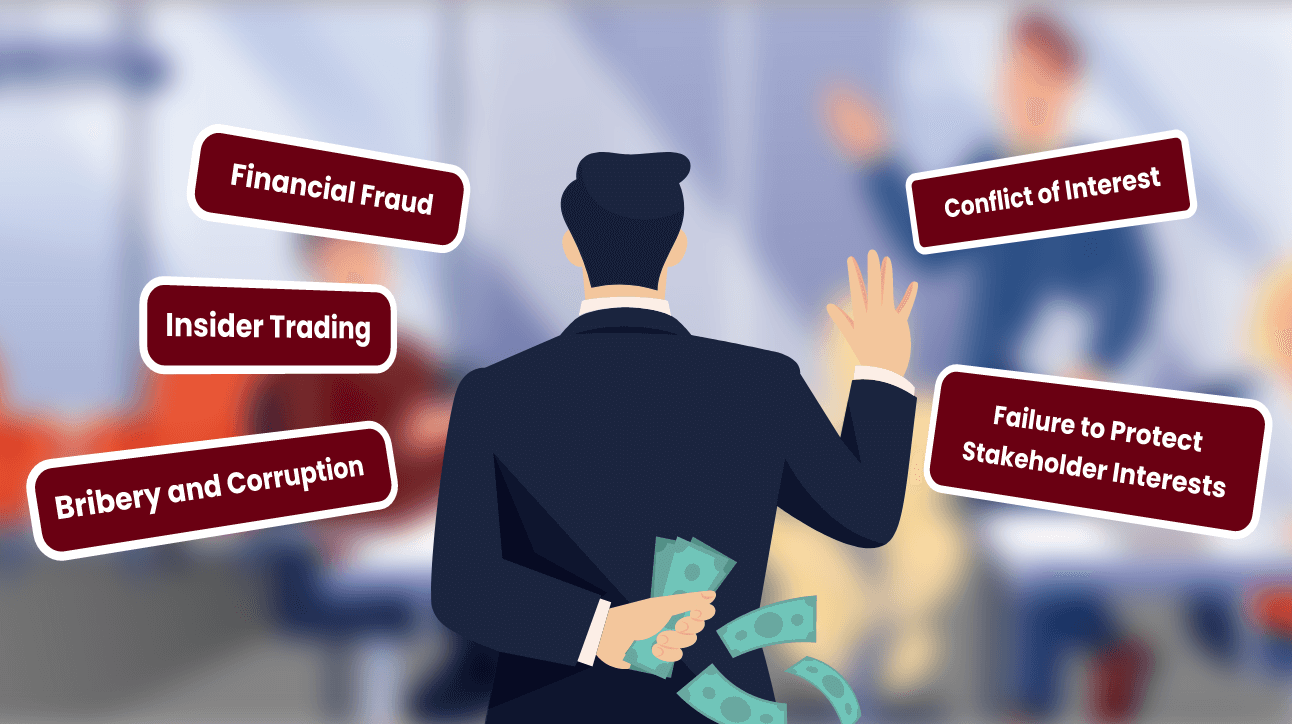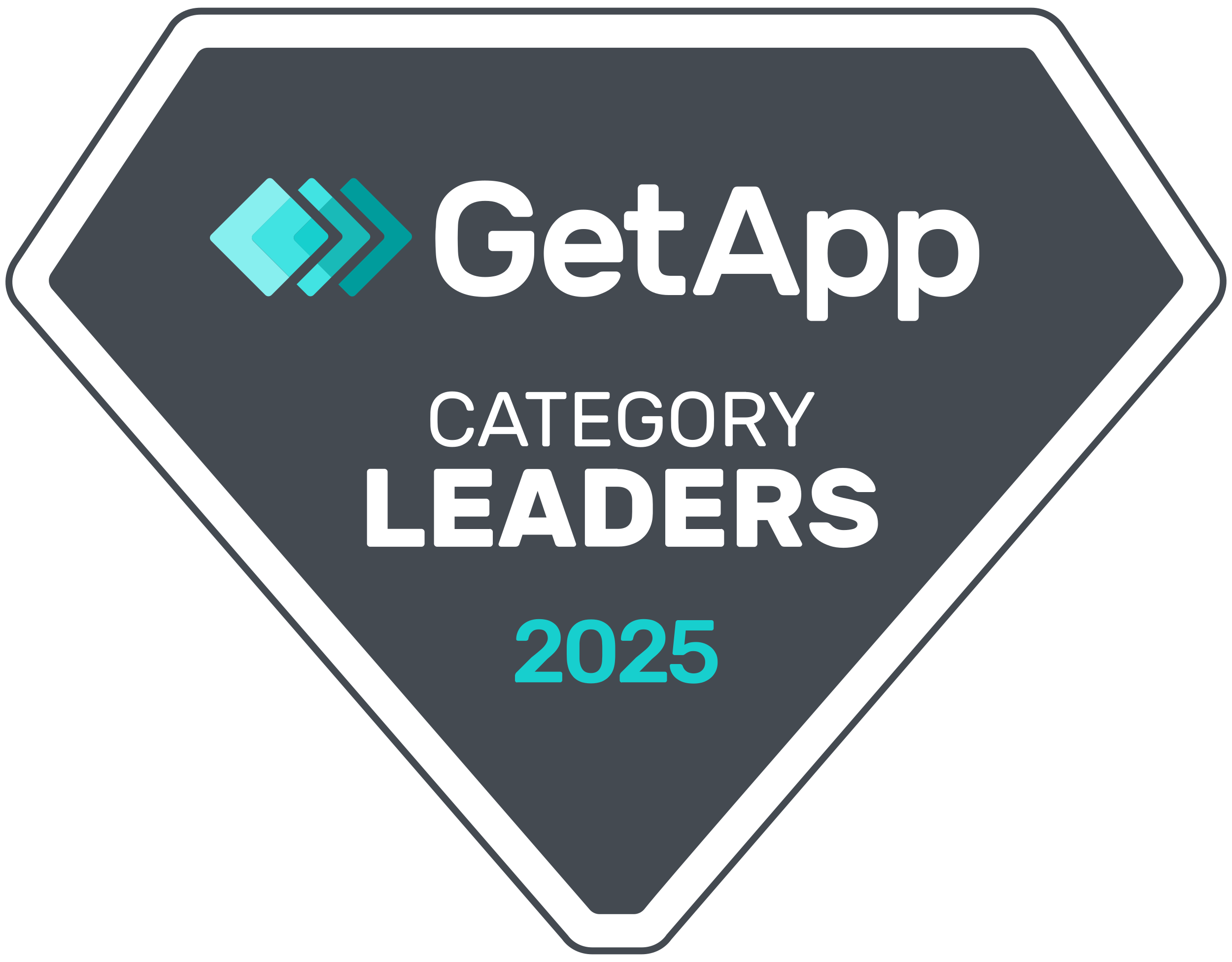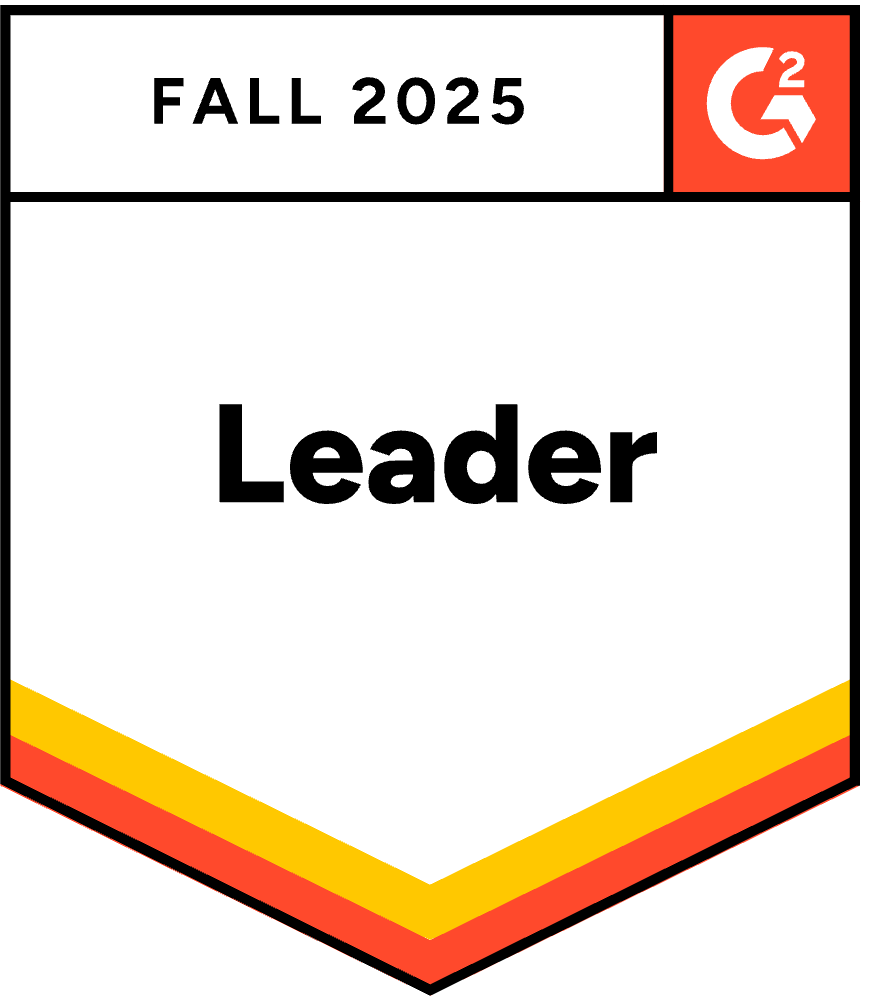Key Takeaways:
- When crafting questions for potential board members, common things that should be considered are the candidate’s understanding of the firm, their ability to plan strategically, their ethics, ability to innovate, knowledge of finance, ability to govern, and manage risk.
- The interview questions for the board of directors assist in figuring out their skills, motivation, cultural fit, and how well they fit with the company’s objectives. It ensures that nominees add genuine value to the board.
- Setting clear goals, employing a structured format, incorporating important stakeholders, and following up with references are all good ways to conduct a board interview.
- A rigorous interview process not only tests a candidate’s talents, but it also makes clear what is expected of them in terms of time, duties, and how they may help the board succeed in the long term.
Board members of publicly listed companies are typically elected by shareholders at annual meetings. Private companies, on the other hand, choose their directors in line with their bylaws or articles of incorporation. Board candidates can be nominated by the company’s nominating committee — a subset of the board tasked with evaluating potential members. In some cases, shareholders can also propose candidates.
Once nominated, candidates are put to a vote at the company’s annual general meeting. Shareholders have the opportunity to vote for or against the proposed directors or abstain from voting altogether.
But while referrals and connections from trusted entities can facilitate the nomination process, each candidate must be assessed based on their skills and experience. One part of this selection process is a thorough interview, confirming that the candidate aligns with the criteria and is well-suited for the role.
Continue reading to know the critical questions to ask board members, and the best practices when conducting the actual interview.
Complete Board Interview Questions for Prospective Members
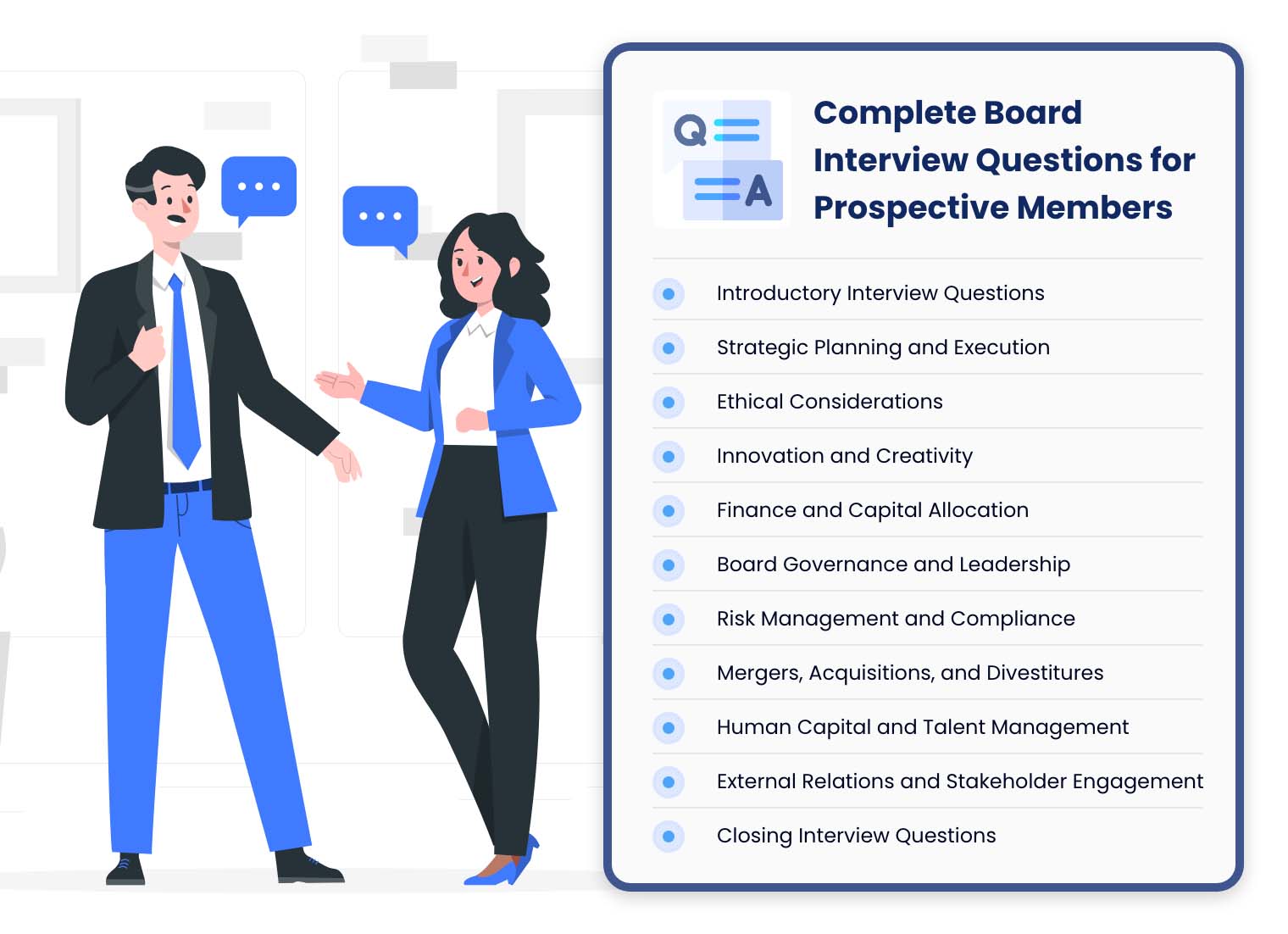
Seeking questions to complete your interview for a prospective board member? We’ve compiled a list of interview questions to help you identify the best candidate for the role. We also have a few general questions for you to start the interview:
Introductory Interview Questions
- What are your areas of specialization or expertise that you believe will benefit our organization?
- Have you previously served on a board? If so, can you describe your role and contributions?
- What motivates you to be involved with our organization? Why are you interested in joining our board?
Company Knowledge and Experience
- What do you know about our company’s history, mission, vision, and values?
- How would you envision your role as a board member in contributing to the company’s vision and mission?
- What specific skills, knowledge, and experience do you bring to the board?
- Given current industry trends and economic conditions, how do you envision the company’s future direction in the next five years?
- Can you articulate the company’s unique value proposition and how it differentiates itself from competitors?
- How do you assess the effectiveness of the company’s current marketing and sales strategies?
Strategic Planning and Execution
- Can you identify potential opportunities and challenges facing our industry?
- How would you approach developing a new business strategy or expanding into new markets?
- What is your experience in leading strategic planning processes and facilitating consensus-building?
- What is your approach to measuring the success of strategic initiatives and identifying areas for improvement?
- How do you stay informed about the latest industry trends and developments? Could you share your preferred methods?
Ethical Considerations
- How do you define ethical leadership?
- What’s your approach to dealing with ethical issues and conflicts of interest on the board?
- What is your approach to corporate social responsibility?
- What is your experience in developing and implementing a code of ethics that reflects the company’s values?
- How do you ensure ethical considerations are integrated into the company’s decision-making process?
- Describe a situation where you faced an ethical dilemma involving conflicting interests. How did you resolve it?
Innovation and Creativity
- How do you foster a culture of innovation within an organization?
- What strategies do you use to encourage creativity and out-of-the-box thinking?
- How do you evaluate new technologies or business models?
- How do you foster a culture of experimentation and risk-taking within a risk-averse organization?
- Can you describe a time when you successfully led a cross-functional team to develop and launch a new product or service?
Finance and Capital Allocation
- How do you evaluate the organization’s financial performance?
- How do you assess a company’s capital structure? What is the most important financial metric to monitor?
- What’s your experience with evaluating and approving capital expenditures?
- What is your approach to setting dividend policies and managing shareholder returns?
- How do you balance making a profit now with investing in future growth and innovation?
- What strategies would you recommend for effective fundraising in the nonprofit sector?
Board Governance and Leadership
- How do you see yourself helping shape the company’s future and ensure good governance?
- Can you talk about your experience leading board meetings and decision-making?
- How do you balance the interests of various stakeholders, like shareholders, employees, and customers?
- What’s your method for evaluating the CEO and executive team’s performance?
- How do you ensure the board provides valuable oversight and guidance to management?
- How would you measure the effectiveness of a board? What key indicators or metrics would you consider?
- What do you consider to be the essential qualities of effective nonprofit leadership?
- What’s your approach to board training and mentorship?
- Have you participated in or led any mentorship programs, and what impact did they have?”
Risk Management and Compliance
- How do you spot and handle potential risks to the company?
- Can you share how you’ve developed and used effective risk management strategies in the past?
- How do you ensure the company stays compliant with laws, regulations, and industry standards?
- How do you assess whether the company’s internal audit and risk management systems are working well?
- Can you discuss a time when you had to showcase adaptability in the face of major organizational changes?
- How would you evaluate the company’s risk management strategies and identify potential vulnerabilities?
Mergers, Acquisitions, and Divestitures
- What’s your experience with evaluating and managing mergers, acquisitions, and divestitures?
- How do you figure out if an acquisition is a good fit and find potential synergies?
- What do you consider when putting a value on a company?
- How do you go about integrating acquired companies into the existing structure?
- What’s your strategy for handling divestitures and assessing non-core assets?
Human Capital and Talent Management
- How do you assess how well the company manages its talent?
- What’s your experience with creating and implementing succession plans for key roles?
- How do you attract and keep top talent in a competitive job market?
- What’s your approach to diversity, equity, and inclusion in the workplace?
- How do you build a positive and inclusive company culture?
External Relations and Stakeholder Engagement
- How do you build and maintain relationships with key stakeholders, like shareholders, customers, employees, suppliers, and regulators?
- How do you approach balancing the demands of various stakeholders, such as shareholders, employees, customers, and the community?
- What’s your experience communicating effectively with the media and managing public relations?
- How do you address stakeholder concerns and resolve conflicts?
- What’s your approach to investor relations and shareholder communications?
- How do you protect the company’s reputation and brand image?
Closing Interview Questions
- Are there any specific areas where you feel you could immediately add value?
- How do you see yourself fitting into the existing board culture and dynamics?
- What are your expectations from the rest of the board and the organization?
- Do you have any questions about the board’s role, responsibilities, or time commitment?
- What excites you most about the possibility of joining our board?
- Is there anything else you’d like to add or discuss before we conclude?
Best Practices for Conducting a Board Member Interview
Now that you have an idea about the questions for potential board members, it’s time to ensure that the actual interview goes as smoothly as possible. Follow these tips:
- Establish clear objectives and prepare — The first thing to do is decide what you want to achieve with the interview. Are you focused on assessing the candidate’s expertise in a specific area? Or, are you more concerned with how they’ll fit into your company’s culture? In addition, review the candidate’s resume, cover letter, and other relevant documents prior to the interview.
- Design a structured interview — To keep things on track, have a game plan. Structure the interview to prioritize key areas: the candidate’s background, their understanding of the organization, and what they can bring to the table.
- Assess for cultural fit — Evaluate whether the candidate’s values and work style align with the company’s culture and mission. For instance, you can ask “Can you share a story about a time you had to navigate conflicting opinions in a team? How did you handle it?” You can also throw in some fun questions to ask board members. This gives you insight into how they’ll interact with your current board of directors and fit into your culture.
- Encourage open dialogue — If you want the candidate to speak candidly, it’s imperative to create a welcoming environment during the interview. Encourage them to ask questions and express their thoughts. This helps you measure their level of interest and how well they’ve grasped the role and its expectations.
- Include key stakeholders — To get a broader perspective on the candidate, it’s best to involve current board members or executive staff in the interview process. They can give input into how well the candidate will work with the existing team.
- Follow up with references — After the interview, don’t skip the reference checks. Reach out to their past colleagues or board members to confirm what you’ve learned. Ask board interview questions like, “What were they like to work with?” and “Can you provide an example of how they handled a tough situation?” This helps validate your impressions and gives you a clearer picture of their past performance.
- Discuss commitments and expectations — It’s always best to clearly outline the time commitment and responsibility required of a board member, from regular meeting attendance, participation in committees, and involvement in special projects. Moreover, address any concerns or questions the candidate may have about the time commitment or expectations.
FAQs About Board Member Interviews

How long does a board interview take?
A board interview typically lasts between 45 minutes to 1.5 hours. Such timeframe also gives the candidate enough time to ask their own questions. However, the exact duration can vary depending on the number of topics you want to cover.
How many people should participate in an interview?
Ideally, one to three people should participate in the interview process. If you’re thinking of a small panel interview, it’s ideal to include a current board member and a senior staff. This gives you diverse viewpoints and a well-rounded view to cover various aspects of the role. However, keep in mind that too many interviewers might make the candidate uncomfortable or the process unwieldy.
What documents should a board member candidate bring to the interview?
Some documents a board member candidate should bring, and you must review include:
- CV or resume
- List of references
- Portfolio or work
- Any certifications or licenses relevant to the board member position
- Published research papers or articles demonstrating their expertise
- Awards or honors received relevant to the board member position
- Financial statements (if applicable), in case the candidate is a potential investor
Is it better to do an online or in-person interview?
If managed properly, both methods can be effective, so choose based on what best suits your board’s needs. While an online interview offers flexibility and convenience, an in-person format provides a more personal touch and an easier way to build rapport.
How do you deal with an interviewee who avoids answering questions?
There are a few ways you can try if a candidate seems to avoid answering board interview questions, you can:
- Rephrase the question to help them better understand what you’re asking.
- Use behavioral questions, framing them in a way that requires specific examples.
- Maintain a calm demeanor and avoid pressuring the candidate, as this might make them defensive or uncomfortable.
Conduct a Smooth Board Member Interview Process with Convene
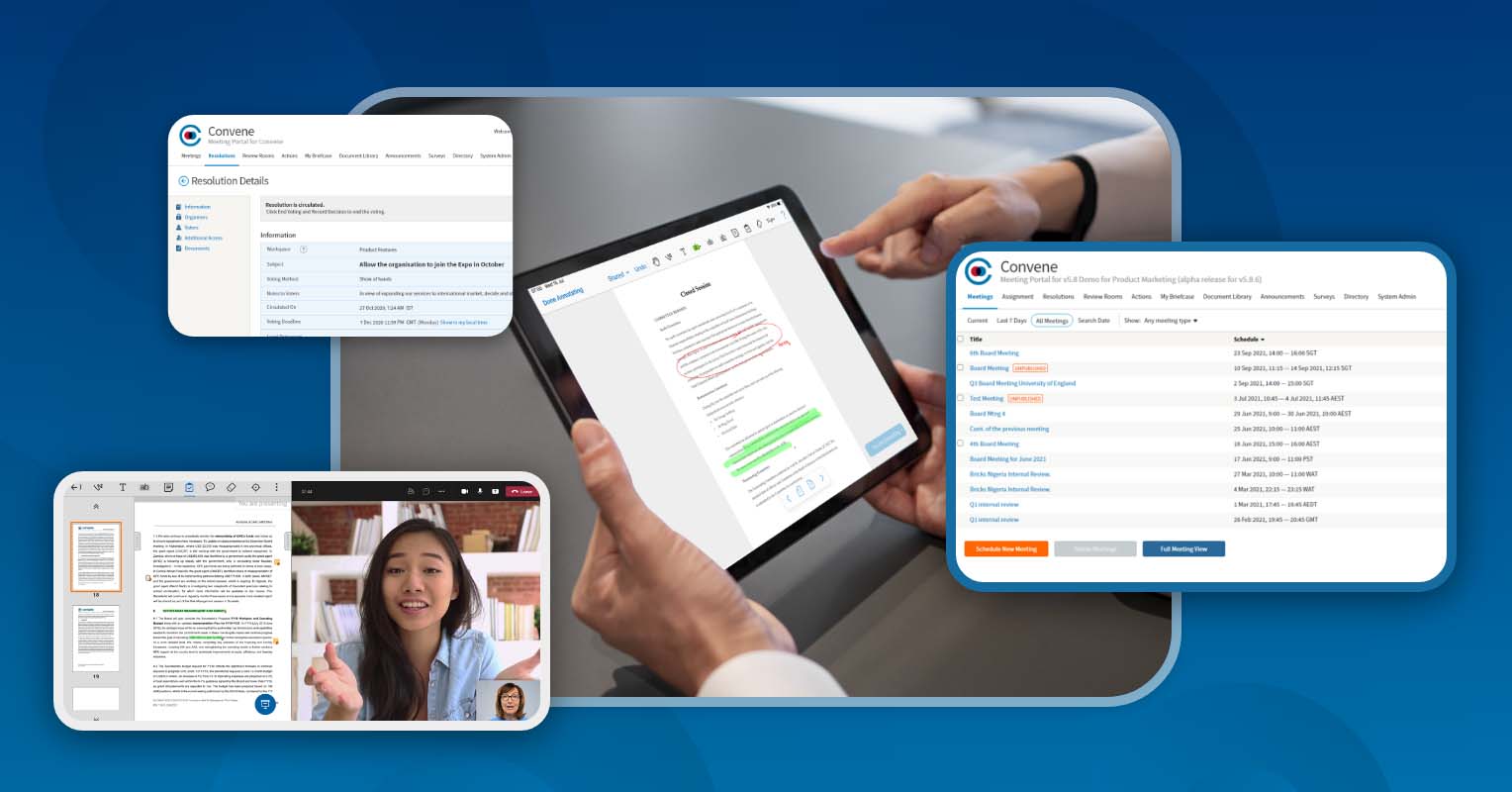
Interviewing potential board members can both be a time-consuming and resource-intensive process. From collecting the necessary documents to scheduling the interviews, tasks can quickly become overwhelming. Want to speed up the board interview process? Convene can make it happen.
Convene, a leading board portal, offers a range of features to simplify your board interviews. Our platform helps you to easily schedule meetings, share documents, and track the candidate process.
- Document Management: Convene’s Document Library enables you to easily store, organize, and share interview-related documents, from candidate resumes to reference checks, with the current board.
- Real-time Collaboration: With the Live Edit feature, board members can easily collaborate on interview materials, and even include interview notes and feedback, whenever necessary. Convene’s Document Versioning is also available to keep track of the changes.
- Meeting Scheduling: Conveniently schedule and manage board interviews with Convene, from sending invitations, tracking RSVPs, and managing meeting agendas.
- Digital Signature: Streamline both the interview and onboarding process using Convene Authority’s integration with digital signature solutions like Adobe Sign, DocuSign, and Sayen.
Request a demo today, and find out firsthand how Convene speeds up and simplifies the board management process.
Jielynne is a Content Marketing Writer at Convene. With over six years of professional writing experience, she has worked with several SEO and digital marketing agencies, both local and international. She strives in crafting clear marketing copies and creative content for various platforms of Convene, such as the website and social media. Jielynne displays a decided lack of knowledge about football and calculus, but proudly aces in literary arts and corporate governance.


![How to Create a Board Skill Matrix + Template [Free Download]](https://cdn.azeusconvene.com/wp-content/uploads/2024Q3_Jul_Board-of-Directors-Skills-Matrix-Whitepaper-C-Dark.png)

